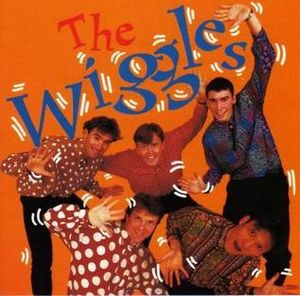The Wiggles (album) facts for kids
Quick facts for kids The Wiggles |
||||
|---|---|---|---|---|
 |
||||
| Studio album by | ||||
| Released | 11 July 1991 | |||
| Recorded | February 1991 | |||
| Studio | Tracking Station Recording Studios, Sydney, Australia | |||
| Genre | Children's music | |||
| Length | 34:42 | |||
| Label | ABC Music/EMI | |||
| Producer | Anthony Field | |||
| the Wiggles chronology | ||||
|
||||
The Wiggles' first album, also called The Wiggles, came out in 1991. It was released by ABC Music and EMI. The band started as a music project at Macquarie University. They took some songs from their old band, the Cockroaches, and also made new children's songs. This album is special because it's the only one that features Phillip Wilcher, who was the fifth Wiggle. It sold 100,000 copies and even won awards from groups like ARIA and APRA!
Contents
How the Album Was Promoted
The Wiggles made two music videos with the Australian Broadcasting Corporation (ABC) to help promote their first album. They also decided to create their own 40-minute video version of the album. They didn't have much money, so they couldn't do fancy editing for the video.
Making the First Video
They asked Anthony Field's nieces and nephews to be in the video. The band's girlfriends also helped by dressing up in character costumes. Murray Cook's wife even made their first costumes! They used two cameras and checked each song's performance as they went. This helped them finish the 40-minute video much faster than other companies could make a three-minute music video.
Getting the Word Out
Jeremy Fabinyi, who used to manage the Cockroaches, became the Wiggles' first manager. He used his connections to help them get their TV show on ABC. He also helped them promote their first album.
Anthony Field gave copies of the album to his young students. He wanted to see how kids reacted to the music. One child's mom returned it the next day because her child wouldn't stop listening! The child had listened to Dorothy the Dinosaur 40 times. The album sold 100,000 copies in 1991. The Australian Recording Industry Association (ARIA) gave the band, including Phillip Wilcher, gold and platinum awards for the album.
Why Phillip Wilcher Left
In 1992, Phillip Wilcher left the Wiggles. He wanted to keep writing classical music. Greg Page said that Phillip helped a lot with how some songs on that first album sounded. Greg also said that Phillip was a "musical genius" and his ideas fit those songs well. However, the Wiggles' music style was changing.
Songs on the Album
Here are the songs you can find on The Wiggles album:
| No. | Title | Length |
|---|---|---|
| 1. | "Get Ready to Wiggle" | 1:57 |
| 2. | "Rock-a-Bye Your Bear" | 1:46 |
| 3. | "Dorothy the Dinosaur" | 2:23 |
| 4. | "Mischief the Monkey" | 0:44 |
| 5. | "Lavender's Blue" | 1:32 |
| 6. | "Glub Glub Train" (Spoken) | 0:19 |
| 7. | "Archie's Theme" | 0:20 |
| 8. | "Montezuma" | 0:32 |
| 9. | "Archie's Theme" (Reprise) | 0:20 |
| 10. | "Ducky Ducky" (spoken) | 0:15 |
| 11. | "A Froggy He Would A-Wooing Go" | 3:36 |
| 12. | "Maranoa Lullaby" | 2:04 |
| 13. | "Stars" (spoken) | 0:09 |
| 14. | "Star Lullaby" | 1:46 |
| 15. | "Okki Tokki Unga" | 1:55 |
| 16. | "O Epoe Tooki Tooki" | 1:37 |
| 17. | "Vini Vini" | 0:58 |
| 18. | "Spot the Dalmatian" | 2:24 |
| 19. | "Johnny Works With One Hammer" | 0:49 |
| 20. | "The Man on the Moon" (Spoken) | 0:21 |
| 21. | "This Old Man" | 2:32 |
| 22. | "Suo Gan" | 1:43 |
| 23. | "Wind" (Spoken) | 0:17 |
| 24. | "Joseph John's Lullaby" | 1:21 |
| 25. | "Desert Dreaming" (Spoken) | 1:52 |
| 26. | "Get Ready to Wiggle" (Reprise) | 1:57 |
Who Was Involved
These are the people who helped make The Wiggles album.
The Wiggles Band Members
- Phillip Wilcher – played piano and sang
- Murray Cook – played guitar, bass, sang, and made water bubble sounds
- Gregory Page – sang lead vocals, played guitar, and clapped his hands
- Jeff Fatt – played accordion, used an Emax sampler, did programming, sang, and was the voice of Mischief the Monkey
- Anthony Field – played tin whistle, didgeridoo, sang, and played the kabasa
Behind the Scenes
- Anthony Field – the producer of the album
- Steve Pomfrett – the engineer who recorded the music
 | Bessie Coleman |
 | Spann Watson |
 | Jill E. Brown |
 | Sherman W. White |

